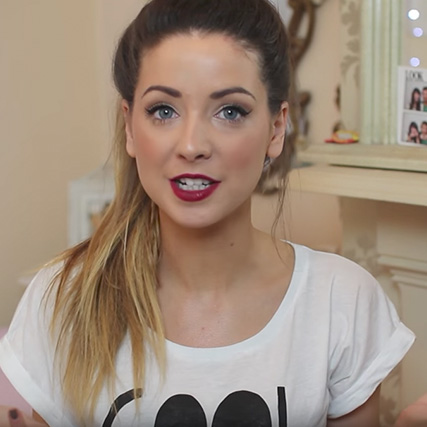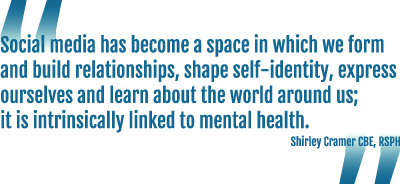The strength of online communities – how YouTube stars tackle poor mental health

Social media is meant to benefit its users by bringing people closer together. You can follow your favourite actor’s day on Instagram, see what your high school crushes are up to on Facebook and even bring powerful politicians down a peg on Twitter.
However, recent research has found that for young users, the majority of common social media sites have an overall negative impact. The Royal Society of Public Health in the UK surveyed 1479 young people, aged 14 to 24, and published the results in their #StatusofMind: Social Media + its Impact report.
Facebook, Instagram, Snapchat and Twitter all have negative results for a range of markers from FOMO – fear or missing out – to bullying and negative body image. Of the five apps studied, only YouTube has been found to have an overall positive benefit for young users.
 The report found that of all the criteria assessed, YouTube scored most positively on raising awareness and understanding of other people’s health experiences, more so than any other platform. YouTube also scored particularly positively on measures of self-expression, community building and self-identity.
The report found that of all the criteria assessed, YouTube scored most positively on raising awareness and understanding of other people’s health experiences, more so than any other platform. YouTube also scored particularly positively on measures of self-expression, community building and self-identity.
The most significant community builders within the online world of YouTube are its vloggers, content creators who film and share everything from makeup tutorials and a capella pop covers, to video diaries and comedy skits. Their confessional-style vlogs and personable social media presences have created huge networks of dedicated fans, watching and sharing their videos around the globe. More and more celebrities have been opening up about their personal journeys with poor mental health [link to Ben’s article] and vloggers have likewise been spending years having conversations about mental health with their vast, young audiences via YouTube channels.

Zoe Sugg, an English beauty and makeup vlogger better known as Zoella, has built up an active social media community, with more than 11 million followers on YouTube. Her Anxiety Q&A video has more than 3 million views and her video on her personal experiences dealing with panic attacks and anxiety has more than 4 million views. Mind, the UK-based mental health organization, went on to invite Sugg to be their first Digital Ambassador and to work with them and YouTube to promote better mental health among young people.
In a statement for Mind, Sugg said, “I know just how isolating it can feel to experience severe anxiety. However, the overwhelming response I’ve received every time I’ve spoken out online, shows just how many young people confront it every day.”
“For many, the internet and social media can be a lifeline. By connecting people with similar experiences and providing access to information and support, the online world has a significant role to play increasing awareness about mental health problems,” said the CEO of Mind in the same statement.
Although vlogs are in no way a substitute for therapy and other mental health interventions, the sense of community and strong connections created by vlogging can have a huge impact on young people experiencing poor mental health. In a 2014 article for The Guardian, Scarlett Curtis, a young writer based in New York, shared how watching Sugg and other vloggers helped her through her depression and severe anxiety, claiming that “millions of people around the world find solace, comfort and joy in the videos they [vloggers] make every single day…They have managed to help more people get through the never-ending battle that is growing up than anyone I can think of since The Beatles.”
Closer to home, Troye Sivan, one of Australia’s best-known vloggers and now a successful pop singer, reached out to his millions of viewers who may be experiencing depression in a video which has been viewed more than 2.6 million times. In the video, Sivan acknowledges his love for his fans and his sadness that there are those amongst that community who are “not feeling great at the moment”. Sivan has also been an outspoken advocate for LGBTI youth and for better awareness around mental health issues more broadly.
Natalie Tran, another Australian vlogger, who goes by the handle communitychannel on YouTube, usually uploads funny monologues or sketches which have gathered her more than 1.8 million follows. A few years ago, she uploaded a video for R U OK Day encouraging people to “embrace the awkward” and support their friends, family and colleagues who may be experiencing mental health issues. To date, the video has been viewed more than 1.5 million times.
Vloggers like Sugg, Sivan and Tran are channelling the best of new forms of media in order reach other young people with positive messages and build supportive communities. In their videos, they encourage seeking help, providing support for friends and reaching out to each other. Through their honesty and approachability, these young YouTube stars are tackling stigma and creating spaces to talk about mental health.
In the words of Scarlett Curtis, the young woman helped through her mental illness by the videos she watched every day, these vloggers are a “new kind of talent, the talent of being a friend, of being a light in a day that might have otherwise been dark, of being a YouTuber.”
By Tasnim Hossain
Newsletter
Stay up to date
Sign up to our Mind Reader newsletter for monthly mental health news, information and updates.